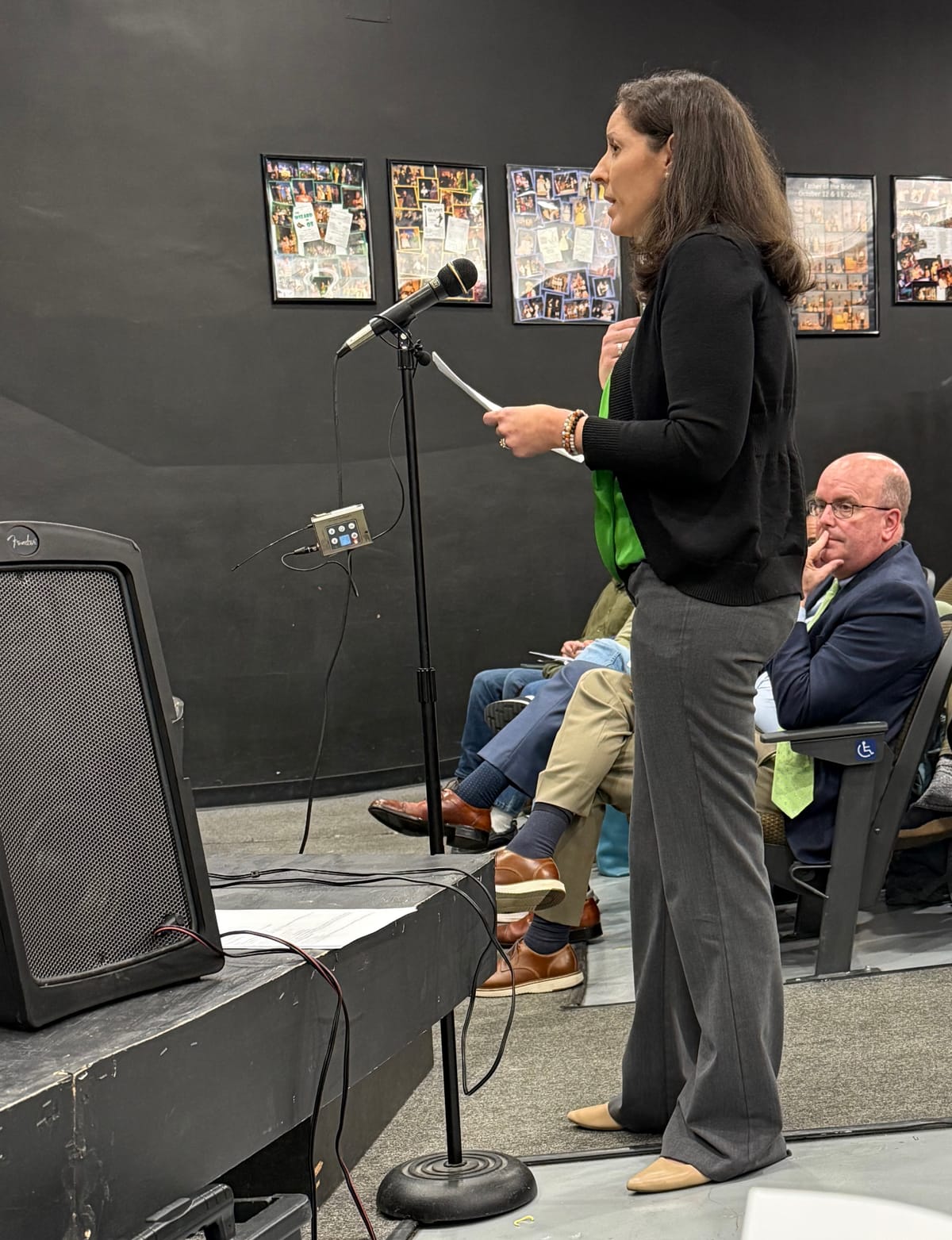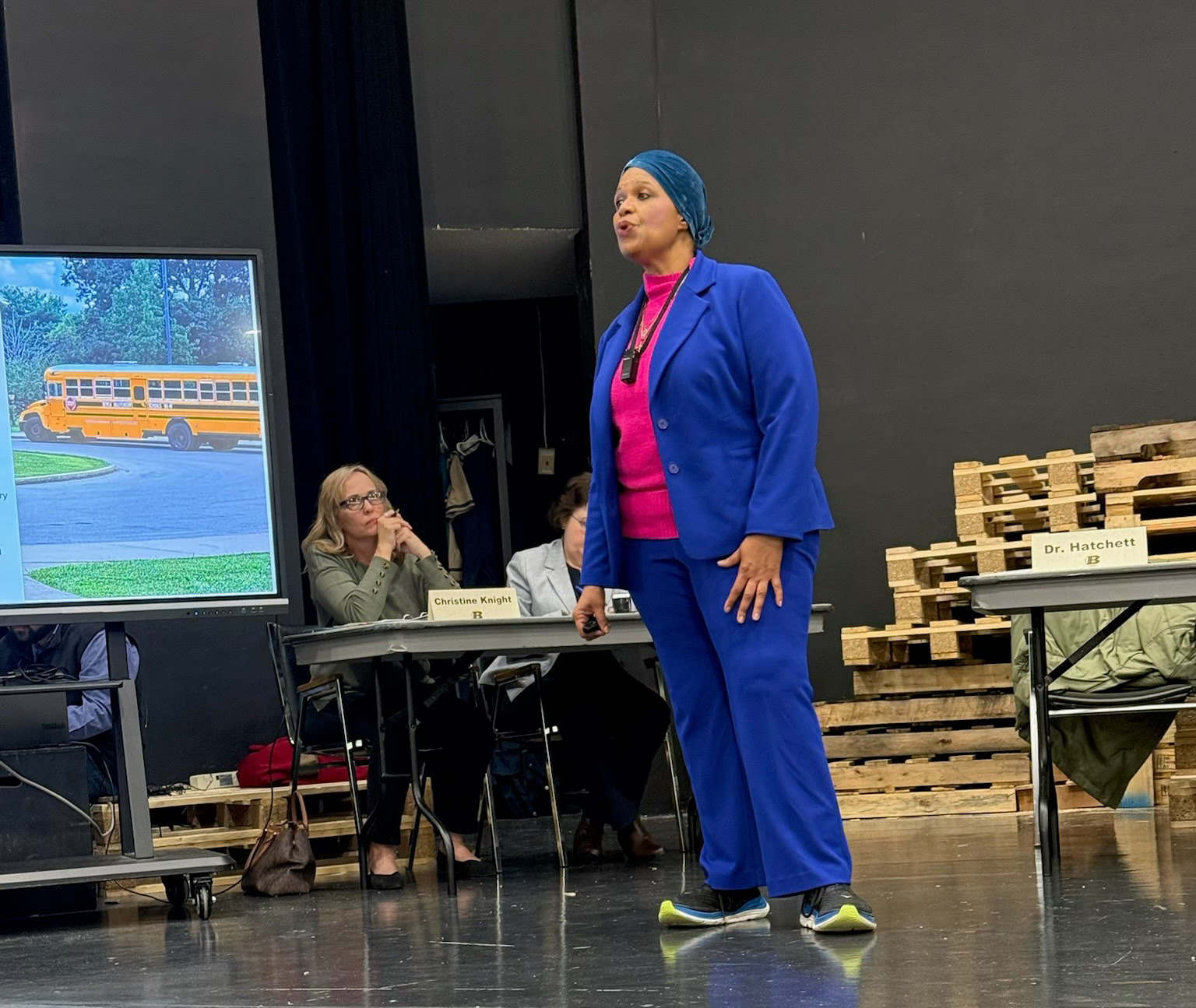Teacher firings: 'Like the Hunger Games'
Parents demand spendy superintendent be fired and Board of Ed pay more attention, as dozens of Community School staff are axed to help close 1.7 million dollar budget gap

BEREA — Dozens of Berea Independent School District teachers, coaches, aides, and others learned Monday they will be unemployed by semester’s end, a move expected to cover 1.27 million of a roughly two million dollar shortfall in the District’s 2025-2026 budget.
Parents and teachers did not mince words expressing their concerns that the loss of beloved teachers will lead Community School to suffer irreparable damage to its reputation as a flourishing center of arts education, and possibly even its utter demise.
They directed their outrage at school superintendent Diane Hatchett and her spending habits, and at the Board of Education for its poor fiscal oversight.
“Most concerning is the superintendent’s spending and her failed leadership which has got us into a significant financial challenge,” Hannah Billings, a Community School parent told the Board. She spoke before an at-capacity crowd, during the public comment section of the Board of Education’s regularly scheduled March meeting.
“She is jeopardizing not only the education of our children, but possibly the future of our school,” Billings said, decrying the forty thousand dollars Hatchett spent on hotel accommodations and first class plane tickets for three out-of-state business trips.
“That’s a teacher’s salary,” Billings said.
The starting salary this school year for public school teachers without an advanced degree in Kentucky is just over thirty-two thousand dollars, according to the Kentucky School Boards Association.
“If you aren’t asking questions, and making the best decisions for our students, then you are an accomplice,” Billings told the Board. “Put [Hatchett] on administrative leave. I believe if she had truly cared about her students, she would already have done that herself…please work diligently to secure a stable and prosperous future for our school or step down and get out of the way.”
Hatchett has announced she will be retiring at the end of this school year. She has been on the jobs since July 2021.

The meeting began with Hatchett’s PowerPoint presentation of the “Budget Reduction Plan.” Under the heading, “District Staffing Reductions,” was a group photo of smiling Community School personnel wearing matching tee shirts in one column and a list of positions to be axed in the adjacent one.
“We went through every scenario we could come up with,” Hatchett said. Implementing the staff reduction plan was to demonstrate to the Kentucky Department of Education that the District is acting in good faith, she added.
“It’s up to KDE what happens. We’re being as honest as possible,” Hatchett said in her presentation. “They could have come in here if they’d wanted to and not wink an eye. They could have gotten rid of all the principals, and have one principal period. No guidance counselors, no band, no arts, that’s it. But we didn’t want to impact the arts, because when you think of Berea, you think of the arts,” Hatchett said.
In all, the elementary school will lose 10 staff, the middle school is to lose 5.5, the high school 8.5, and the preschool, 3. The “halves” are likely to be met by giving remaining staff overlapping duties. Multiple athletics program positions were cut, and to save money on fuel, the District will seek to compete in local conferences instead of ones further away. Parents might also be asked to transport athletes to games.
Numerous parents with special needs kids were left wondering how to prepare their children for the changes.
A woman who identified herself only as “Katie” told the Board she was confused by the firings and asked, “How are you going to inform us about who is leaving and why? My daughter has autism. How do I prepare her?”
Hatchett did not enumerate which specific subjects were to lose staff. Furloughs begin at the end of this semester.
A ‘different perspective’
Nathan Sweet, the District’s new finance director, spoke next. His presentation would overlap much of Hatchett’s, he said, “But maybe I will provide a little different perspective on it.”
Sweet listed other austerity measures in addition to staff cuts, such as a salary freeze in the next school year. Overtime hours also will now be restricted. Additionally, he said the cost of feeding staff during training days was out of hand, and would stop, as would bus monitor stipends.
A full custodial staff, which had been cut during the pandemic, will be brought back to the District, Sweet said, to cut back on the more costly contract services and teacher room cleaning stipends. This move is expected to save more than one hundred fifty thousand dollars.
After reviewing previous years’ budgets, Sweet said he’d found multiple positions on the payroll that were not approved by the Board. “We’ve got to start getting a handle on that,” he said.
Citing a lack of oversight, Sweet told the Board, “I want to have some procedures in place that make it more difficult and requires more justification for purchases, so we can make sure that every purchase is really vetted.”
He introduced a stepwise plan for cross checks on virtually any expenditure over one thousand dollars, including moving the threshold for Board approval of purchases down from forty-thousand dollars to fifteen thousand dollars.
Sweet admitted this new system of checks and balances, along with the cuts, was not a sure thing. “Until we’ve done it for a couple of years, we won’t know if it works,” he said.
Also at issue for the District is a six hundred thousand dollar tax rebate that has not come through on a solar paneling project the school is installing, although Sweet clarified that even if that had come through by now, there would still need to be drastic budget cuts.
Sweet said that the projected revenues he’d inherited when he took the job in January were too high. “We started the year with a working budget of 14.6 million in revenues, and that’s really at the core of our problem. I’m only projecting 12.2 million dollars in revenue for next year,” he said.
Since taking the job, Sweet said he has revised the budget downwards by just over 1.6 million dollars, and that the current budget includes a contingency fund of about three hundred thousand dollars.
Tenure no protection
Community School chemistry teacher Chris Preece told the Board that despite his tenure, he was let go. “Now there is only going to be a science department of one. I have no idea how an entire high school will offer one science teacher,” he said.
Preece also asked whether top level officials and staff would also be suffering repercussions from the budget cuts, drawing applause from the audience.
Preece told The Edge after the meeting, “I was home sick today, but I got the call that I was pink slipped.”
He said that after the meeting that after a decade on the job, the tenure he’d earned should have been protective, but that the superintendent had found a work-around: “They just cancelled my whole program.”
‘Like the Hunger Games’
Although in the days leading up to the firings, Hatchett sent an email to Community School teaching staff warning of potential cuts, many teachers expressed shock and anger at how leadership carried them out.
“How the teachers were pink slipped today, it was like The Hunger Games. It was like, who is going to be called down next to walk across the parking lot [to the District’s office building], to be fired next? It could have been done with more dignity and respect,” Ashley Hammond told the Board.
The Hunger Games is a children’s book and film franchise about a dystopian future that warns against unchecked power.
Earlier in the day, The Edge was on site at the District’s office building, and witnessed as a man wearing a staff ID badge was called into the superintendent’s office, while another woman wearing a badge walked alone from the school, across the parking lot and up to the building.
From the audience, a woman who did not give her name but who teaches in the Jobs for America’s Graduates, or JAG, program which has been cut, asked how she was to face her 65 students, after having just been devastated by the news.
‘Say you’re sorry’
Of the 15 persons who spoke at the microphone, all but one pilloried the superintendent and the board. Kimberly Dillon said the firings were not the superintendent’s fault, before describing her upset with a teacher who didn’t treat her daughter well and telling people to stop blaming others. Her words were meet with a chorus of boos.
“I don’t think it’s blaming,” said Audrey Woodward responded. “We need to come to an account of how this happened,” she told the Board. “We need specific information on how we got here and to make sure it doesn’t happen again. We need accountability and making amends. There is nothing that has been said so far that makes amends.”
Woodward said she would like to demand parents be allowed to help create the budget because, she told the Board, “A 1.3 million misalignment? We can’t trust you.”
At the conclusion of the public comment section, Board chair, John Morgan told the audience, “We will do better. That’s what we will commit to. We will do better.”
“We only get so much information,” Board member Tom McCay said.
“I’m only here one night a month—” McCay continued before Morgan cut him off, and re-iterated the Board needed to do better.
Board member Dr. Jackie Burnside said, “All of us on this board are just as pained as the superintendent and the other staff.”
The Board’s vice chair, Sarah Rohrer, who was only recently added to the board, responded to Woodward, “The role of financial oversight is that of the superintendent, and the school board, alongside the financial officer, and we did not succeed. And for that, I will apologize.” To applause, Rohrer added, “The people who are affected are not the people who got us here.”
Echoing what she’d said to the Board, in an interview after the meeting, parent Jacquelyn Abrams told The Edge she wanted to know why no one was monitoring spending better, and asked when an apology would be issued from those in charge who let the funding gap become so wide: “Is anyone who actually was responsible going to say they’re sorry?”
Board member Nathaniel Hackett did not comment on the audience’s participation.
The next regularly scheduled Board of Ed meeting will be Monday, April 21, in the Kennedy Theater at Community School.
Here is a copy of the Budget Reduction Plan:
The Edge is Berea’s best source for news and information. Support this local, reliable journalism with a paid subscription.
Update: On Tuesday, March 18, at 12:12pm, this article was updated with an “explainer” about The Hunger Games, and to correct some misspellings. Two million was also adjusted to 1.3 million in the headline.




